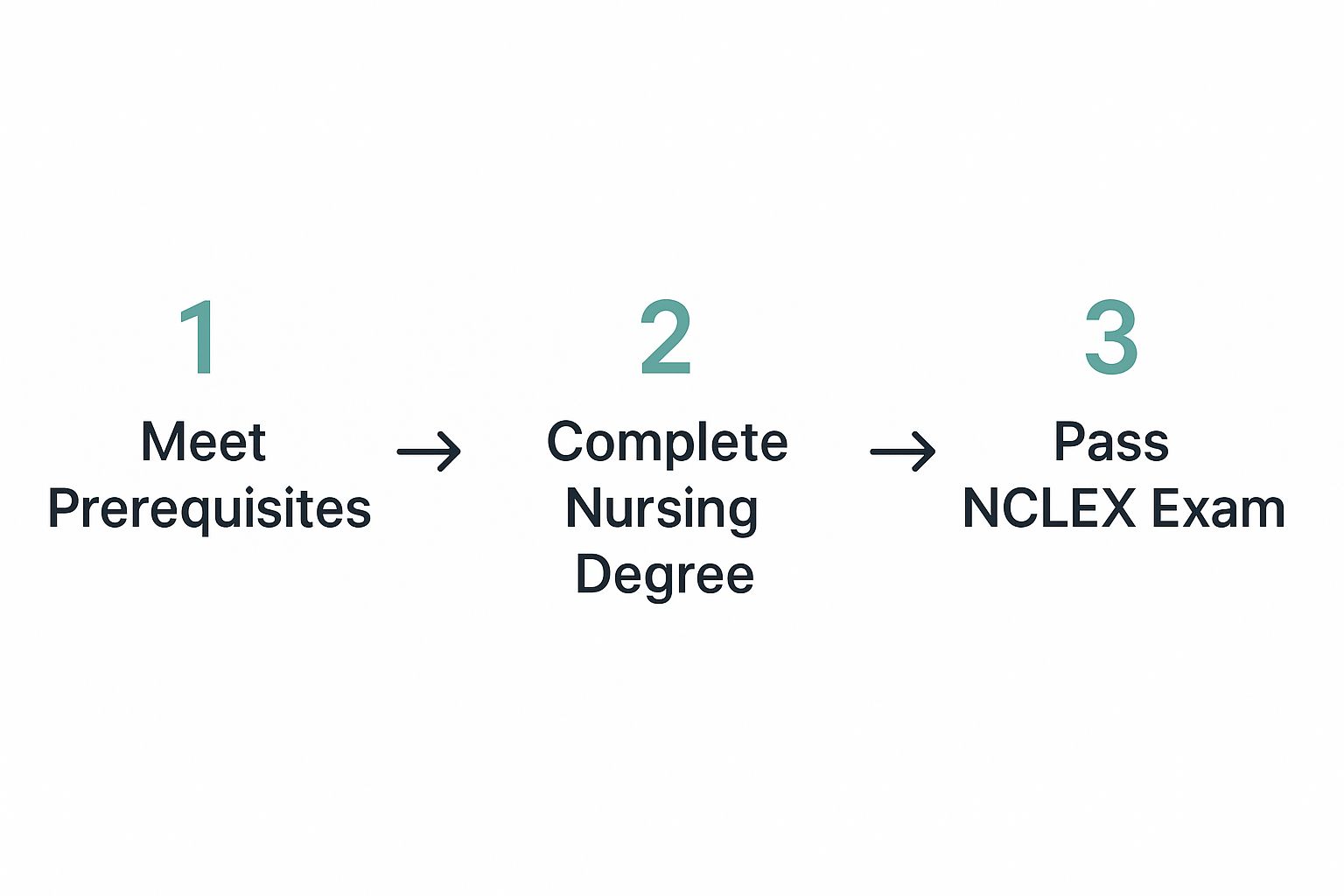
Are you thinking about a career as a registered nurse in the UK? It's a fantastic and rewarding path, but getting there involves a few key steps. To succeed, you'll need to complete an approved nursing degree, get plenty of hands-on experience through clinical placements, and register with the Nursing and Midwifery Council (NMC). This guide will walk you through everything you need to know.
Your Roadmap to Becoming a UK Registered Nurse
Deciding to become a nurse is a huge first step. It's a role that demands compassion, skill, and resilience, placing you at the very heart of patient care. The UK has a clear, structured pathway to ensure every nurse meets the high standards required before they can officially join the register.
Think of this guide as your personal roadmap. We'll break down the entire process so you can start your journey with confidence. It all comes down to two things: academic study and hands-on experience, woven together from start to finish.
This visual gives you a great overview of the main stages, from starting your education all the way to getting that professional registration.

As you can see, the journey follows a clear progression, moving from foundational requirements right through to final licensure.
Understanding the Journey Ahead
It's a big decision, so let's look at what you can expect. The great news is that qualified nurses are always in high demand across the UK. In fact, the profession is growing faster than ever.
As of 31 March 2024, there are an incredible 848,251 professionals on the NMC register. This includes 788,074 registered nurses, a 3% increase from the previous year. That number tells a clear story: there's a constant and growing need for fresh talent just like you.
Your journey will be a blend of rigorous academic learning and immersive, hands-on clinical practice. This dual approach ensures you graduate not just with theoretical knowledge but with the confidence and competence to care for patients from day one.
To give you a clearer picture, this table summarises the key milestones you'll need to hit.
Key Milestones to Becoming a Registered Nurse in the UK
|
Milestone |
Key Requirement |
Typical Duration |
|---|---|---|
|
Meet Entry Requirements |
A-levels or equivalent (e.g., Access to HE Diploma), plus GCSEs in English, Maths, and a science. |
1-2 years |
|
Complete a Nursing Degree |
Enrol in and complete an NMC-approved degree in one of the four nursing fields. |
3-4 years |
|
Gain Clinical Experience |
Complete a minimum of 2,300 hours of clinical practice as part of your degree. |
Integrated into degree |
|
Register with the NMC |
Successfully pass the NMC’s requirements and officially join the register. |
Post-graduation |
This table shows how each step builds on the last, from your initial qualifications to becoming a fully registered professional.
Each stage, from choosing a university to your first day on the ward, is a crucial building block. This thorough preparation is what makes UK-trained nurses so respected around the world. To dig even deeper into this career path, you can explore our full guide on how to become a nurse for more valuable insights.
Choosing the Right Nursing Education Pathway

Ready to take the first step? Your first major decision is choosing the right educational path for you. While there are a few different routes, they all lead to the same destination: professional registration with the Nursing and Midwifery Council (NMC).
Picking your route is a personal choice. It's about finding what fits your life, career goals, and current situation. The most common path is the full-time, three-year undergraduate nursing degree, but it's not the only option available.
Let's break down the choices so you can find the perfect fit.
The Undergraduate Nursing Degree
The BSc (Hons) in Nursing is the most popular route for a reason. It's a comprehensive, university-based programme that provides a solid academic foundation alongside structured clinical placements. Your time is typically split 50/50 between classroom theory and hands-on practice, which is the perfect blend to build both your knowledge and your confidence.
These degrees are designed to be immersive. You’ll dive deep into everything from human anatomy and physiology to the principles of evidence-based practice and person-centred care. It’s a challenging but incredibly rewarding experience that prepares you for the realities of modern nursing.
A crucial thing to remember is that you'll need to choose your specialism right from the start. This decision shapes your entire degree—from the modules you study to the placements you undertake—and sets the foundation for your future career.
The UK's nursing education is held to a very high standard. While most nurses qualify through this three-year degree, our nursing workforce is also wonderfully diverse, with many skilled professionals joining from overseas. In fact, the latest NMC registration data shows just how much the UK relies on and welcomes internationally educated nurses.
Choosing Your Nursing Specialism
When you apply for a university place, you won't just be applying for "nursing" – you'll need to select a specific field. This is a key decision that will direct your training from day one.
Here are the four main fields you can choose from:
-
Adult Nursing: This is the most common specialism. You'll care for adults of all ages, managing everything from acute illness in an A&E department to long-term conditions in a community clinic.
-
Children’s Nursing: Also known as paediatric nursing, this field is all about caring for young people, from newborns to teenagers. It requires unique skills to meet their health needs and communicate effectively with them and their families.
-
Mental Health Nursing: Here, you'll support people experiencing mental health challenges like depression, psychosis, or anxiety. It’s a collaborative role focused on recovery and wellbeing, practised everywhere from community centres to secure hospital units.
-
Learning Disability Nursing: This specialism focuses on empowering people with learning disabilities to live independent, fulfilling lives. You'll act as an advocate, helping them manage their physical and mental health.
Alternative Routes Into Nursing
What if a full-time, three-year degree doesn't work for you? Don't worry, there are other excellent, well-established pathways into the profession.
A Nursing Degree Apprenticeship is a brilliant "earn while you learn" option. You'll be employed by a healthcare provider (like an NHS Trust), work as part of the team, and study for your degree part-time. It usually takes around four years and is perfect if you prefer hands-on learning and need to earn a salary.
Another great option is a Postgraduate Diploma in Nursing. If you already have a degree in a related subject—such as biology, psychology, or social work—you can take an accelerated two-year course. This fast-track programme builds on your existing academic skills, focusing purely on the nursing knowledge and practice you need for registration.
A Quick Comparison of Your Options
|
Pathway |
Typical Duration |
Key Feature |
Best For |
|---|---|---|---|
|
BSc (Hons) Nursing |
3 Years |
Full-time, university-led study with a 50/50 split of theory and placements. |
Those wanting the traditional, immersive university experience. |
|
Nursing Apprenticeship |
4 Years |
Earn a salary while you work and study part-time. |
People who need to earn an income and learn best by doing. |
|
Postgraduate Diploma |
2 Years |
An accelerated, full-time course for those who already have a degree. |
Graduates who want a fast-track way into a nursing career. |
Ultimately, there's no single "best" path. The right choice is the one that aligns with your learning style, financial situation, and long-term goals. My advice? Do your research. Attend university open days, talk to current students and apprentices, and really dig into the details of each programme to find your perfect fit.
Crafting a Standout Nursing Application and Acing the Interview

Getting into a good nursing programme is competitive. Your application isn't just a list of your grades; it's your first chance to show admissions tutors who you are and why you have what it takes for a career built on compassion and skill.
The personal statement is the heart of your application. This is where you connect your life experiences to the core values of nursing. Forget just saying you "want to help people." You need to show it with real-life examples.
Writing a Personal Statement That Shines
Think of your personal statement as the story of your journey towards nursing. The key is to link your experiences—whether from volunteering, a part-time job, or personal challenges—directly to the principles that guide nursing in the UK.
For instance, did you work in a busy café? Talk about juggling orders during the lunch rush (time management), dealing with difficult customers calmly (communication), and staying cool under pressure. These are all fundamental nursing skills in action.
To make a real impact, weave your experiences into the NHS values.
-
Compassion: Describe a time you showed genuine empathy. It doesn't need to be a huge, dramatic event; often, small acts of kindness make the most powerful stories.
-
Commitment to Quality of Care: When did you go the extra mile? Maybe you stayed late to ensure a project was done right. This reveals your dedication to high standards.
-
Working Together for Patients: Share a story of successful teamwork. What was your role? How did you contribute to the group's success?
-
Respect and Dignity: Recall a situation where you treated someone with respect, especially when they were vulnerable or upset. This is a daily reality in nursing.
-
Everyone Counts: Nursing is about providing fair care to all. How have you demonstrated inclusivity in your own life?
-
Improving Lives: This is the ultimate goal. Circle back to your core motivation—a genuine desire to positively impact people’s health and wellbeing.
Your personal statement isn't a checklist. It's a narrative that should leave the reader with a clear picture of your character, your resilience, and your passion for nursing.
Preparing for the Nursing Interview
Landed an interview? Congratulations! Your application did its job. Now, you need to bring that same person from the page into the room. Universities use interviews to see how you think on your feet and to get a real sense of your personality.
Be aware that many universities now use different interview formats, not just simple Q&A sessions.
Value-Based Interviews
These conversations are all about you and your values. The questions are designed to see how well you align with the core principles of nursing.
-
A typical question might be: "Tell us about a time you handled a stressful situation. What did you do, and what did you learn?"
-
What they’re looking for: They want to see your resilience, self-awareness, and problem-solving skills.
Multiple Mini Interviews (MMIs)
This format is like a circuit. You’ll move through several short, timed "stations," each with a different scenario or task, such as role-playing or discussing an ethical dilemma.
-
An MMI station could involve: Explaining a health concept to an actor playing a confused patient or debating a healthcare policy.
-
What they’re looking for: Your empathy, communication skills, critical thinking, and your ability to see different perspectives under pressure.
Whatever the format, solid preparation is key. Research the university and its nursing programme, and be ready to explain why you chose them. For more in-depth advice, check out these excellent interview tips for nursing applicants to walk in feeling confident and ready.
Thriving in Your Placements and Gaining NMC Registration
Your nursing degree is a careful blend of theory and practice, but it's during your clinical placements that everything truly clicks. This is where you step out of the classroom and onto the ward. You'll spend a significant part of your course—at least 2,300 hours—working alongside seasoned professionals, turning academic knowledge into life-saving skills.
These placements are anything but passive. You're there as an active member of the healthcare team, learning by performing essential duties under expert supervision. It’s an incredible chance to apply your learning, build your confidence, and start shaping your identity as a nurse.
Your placements will be deliberately varied to give you a full picture of the profession. One month you might be on a fast-paced surgical ward, the next with a community mental health team, in a GP surgery, or on a specialist children's unit. This exposure shows you the huge range of opportunities that nursing offers.
Making the Most of Every Placement
Your attitude on placement is everything. Your success depends on the relationships you build with your practice supervisors and assessors—the experienced nurses guiding and evaluating you. They are your most valuable resource, so build a strong, professional connection from day one.
Show up prepared, ask thoughtful questions, and be open to feedback. Don't wait for learning opportunities to come to you; actively seek them out. If you see a procedure you’ve never witnessed, ask if you can observe. If a patient’s care plan seems complex, ask your supervisor to walk you through it.
To help you navigate this, here are some practical tips to keep in mind.
Making the Most of Your Clinical Placements
|
Do |
Don’t |
|---|---|
|
Introduce yourself to the team at the start of every shift. |
Wait to be told what to do; be proactive. |
|
Ask thoughtful questions about patient care and rationale. |
Be afraid to admit you don’t know something. |
|
Actively seek out learning opportunities and new experiences. |
Shy away from feedback; see it as a chance to grow. |
|
Take initiative with tasks you’re cleared to perform. |
Engage in ward gossip or unprofessional conversations. |
|
Reflect on your experiences at the end of each day. |
Forget to thank your supervisors and the team for their time. |
By adopting a proactive and enthusiastic mindset, you'll not only pass your placements but also gain the respect of your colleagues and mentors.
Think of each shift as a masterclass. Your goal isn't just to complete the hours, but to absorb as much practical wisdom as possible. Enthusiasm, curiosity, and a willingness to get involved will make you stand out and ensure you get the most from every experience.
The skills you build here are the foundation of your entire career. Showing how you took initiative on placements can be a fantastic way to impress future employers. Find more advice on how to make your nursing application stand out by highlighting these exact qualities.
Crossing the Finish Line: NMC Registration
After years of hard work, the final step is to officially join the Nursing and Midwifery Council (NMC) register. This is the moment it all comes together—the point where you finally transition from student to professional.
The process is straightforward but requires attention to detail. As soon as your university confirms you’ve successfully completed your approved nursing programme, you can start your online application with the NMC.
A few key checks ensure you meet the high standards the public expects.
-
Health Declaration: You'll need to confirm that your health allows you to practise safely.
-
Character Declaration: You must provide evidence of good character, usually through a self-declaration and references.
-
Registration Fee: There's a fee to join the register, currently £120 for nurses who qualified in the UK.
Once your application is approved, your name is added to the NMC register, and you'll receive your unique PIN (Personal Identification Number). Only then can you legally practise and call yourself a registered nurse. This is a huge milestone, signalling that you are a qualified, accountable, and trusted professional ready to make a difference.
Thriving in Your First Year as a New Nurse

Congratulations, you've made it! The degree is framed, your NMC PIN is in hand, and you are officially a registered nurse. It’s a massive achievement, but your first year as a Newly Qualified Nurse (NQN) is a whole new kind of education.
Let’s be honest: the jump from student to accountable professional is huge. Your training gives you a brilliant foundation, but nothing fully prepares you for that first day. The secret to thriving is to lean into the support around you and take charge of your development.
Your Preceptorship is Your Lifeline
Almost every healthcare employer provides a preceptorship programme for new nurses. This isn't just another box to tick; it’s a crucial support system built to help you find your feet. This period, usually lasting six to twelve months, pairs you with an experienced nurse—your preceptor.
Your preceptor is your go-to guide, mentor, and advocate. They are there to help you connect theory with messy, real-world practice. They'll answer your questions (no question is a silly one!) and help you build your clinical confidence. Make the most of this relationship.
Your preceptorship is a protected time for learning. It's a formal acknowledgement that you are still developing your practice. Use this period to ask questions, seek feedback, and build the confidence you need to become a competent and self-assured nurse.
Leaning on this structure really matters. Proper support in the first year directly boosts nurse retention and job satisfaction. Your preceptor gets it—they’ve been in your shoes.
Building Confidence and Keeping Your Head Above Water
Your first year will be an emotional rollercoaster. One shift, you’ll feel on top of the world; the next, you might feel like you're drowning. I promise you, this is completely normal.
Clinical confidence isn't something you're given; it's built through repetition and practice. Don’t shy away from opportunities to practice skills, especially the ones that make you nervous. The more you do something, the more it becomes second nature.
Here are a few tips to help you navigate your first year:
-
Get Organised: Use a notebook or 'brain sheet' to map out and prioritise your tasks for the shift. If you feel overwhelmed, ask for help. Learning to delegate is a vital nursing skill, not a weakness.
-
Find Your People: Connect with other newly qualified nurses. Having peers on the same journey is incredibly powerful. You can share stories and support each other in a way no one else can.
-
Be Kind to Yourself: You will make mistakes. Everyone does. The trick is to own them, learn from them, discuss them with your preceptor, and then let them go. Treat yourself with the same compassion you show your patients.
-
Protect Your Downtime: Learn to switch off when your shift ends. It’s tempting to overthink your day, but protecting your time off is essential for avoiding burnout.
Your Education Has Only Just Begun
Becoming a registered nurse isn't the finish line; it’s the starting block for a career of lifelong learning. To keep your registration with the NMC, you’ll need to complete revalidation every three years.
Think of revalidation as your chance to show you’re keeping your knowledge fresh and practising safely. It involves reflecting on your work and gathering evidence of your professional development.
A huge part of this is Continuing Professional Development (CPD). The NMC requires you to complete 35 hours of CPD every three years, with at least 20 of those hours being 'participatory'—meaning you're learning alongside others.
This could include:
-
Attending study days or practical workshops
-
Completing online learning modules
-
Reading and discussing journal articles with colleagues
-
Receiving coaching or mentoring from a senior nurse
CPD isn’t a chore; it's an investment in yourself and your career. It’s how you stay on top of best practices, explore new specialisms, and become an even better nurse. Start building good habits for recording your learning from your first year—it will make revalidation a breeze.
Your Questions Answered: The Realities of Nurse Training
Thinking about a career in nursing brings up a lot of questions. It's a big commitment, so let's clear up some of the most common queries people have. Getting these practical details straight will help you plan your path with confidence.
What Grades Do I Actually Need to Get In?
To get a spot on a nursing degree course, you'll need to show you're ready for university-level work. While every university has slightly different standards, there are some common benchmarks you should aim for.
Most universities will want to see at least two (but usually three) A-levels. Alternatives are often accepted, such as:
-
A BTEC Extended Diploma in a related subject like Health and Social Care.
-
An Access to Higher Education Diploma in Nursing, which is specifically designed for this purpose.
On top of that, you'll almost certainly need GCSEs in English and Maths at grade 4 (formerly C) or higher. Many courses also ask for a science GCSE, so having Biology or Chemistry is a big plus. Always double-check the specific entry requirements on the websites of the universities you're interested in!
How Can I Afford to Study Nursing in the UK?
The cost of a degree is a major worry for many, but there’s good news: a solid financial support system is in place for nursing students in the UK.
As a UK student, you can get a tuition fee loan from Student Finance to cover the entire cost of your course. You only start paying this back once you're earning above a certain amount.
Even better, nursing students can apply for the NHS Learning Support Fund. This is a training grant of at least £5,000 for every year of your course, and you don't have to pay it back. There's also extra money available if you have children or are training in a specialism that's in high demand, which really helps lighten the load.
The combination of the tuition fee loan and the NHS grant makes a nursing degree a realistic goal for people who might otherwise think it's financially out of reach.
Can I Have a Job While I'm on My Nursing Course?
Juggling work and a nursing degree is tough, but it's not impossible if you are highly organised. Your course is a full-time job in itself, split between lectures and 2,300 hours of clinical placements. Those placement shifts can be unpredictable – nights, weekends, long 12-hour days – which makes a regular part-time job very difficult.
So, what's a good solution? Many students join their local NHS Trust’s ‘nurse bank’ to work shifts as a Healthcare Assistant (HCA). This is a brilliant move because:
-
It’s flexible: You pick up shifts that work around your university and placement schedule.
-
It's relevant: You get paid to gain hands-on experience that directly supports your learning.
-
You build connections: You get to know the hospital and staff long before you qualify.
It demands excellent time management, but it's a fantastic way to earn money while getting a head start on your clinical skills.
What Can I Expect to Earn as a Newly Qualified Nurse?
Once you've passed your exams and registered with the NMC, you'll start your NHS career on a specific pay band. In England, newly qualified nurses typically start at Band 5 on the Agenda for Change pay scale.
Right now, a Band 5 starting salary is over £28,400 a year. Your pay goes up each year as you gain more experience in that band. You can also earn more through "enhancements" for working unsociable hours like nights, weekends, and bank holidays. Pay scales in Scotland, Wales, and Northern Ireland are very similar.
Ready to take the next step towards a fulfilling career in healthcare? At Stonebridge Associated Colleges, we offer flexible, online Access to Higher Education Diplomas that can pave your way to a nursing degree. Explore our courses today and start your journey with the support you need at https://www.stonebridge.uk.com.




